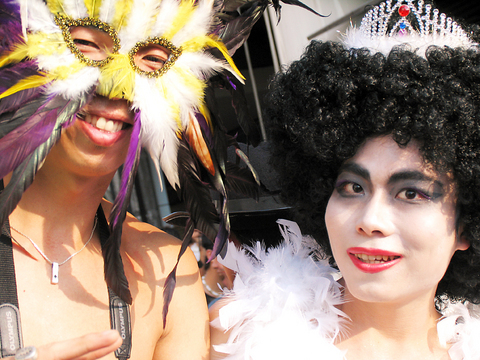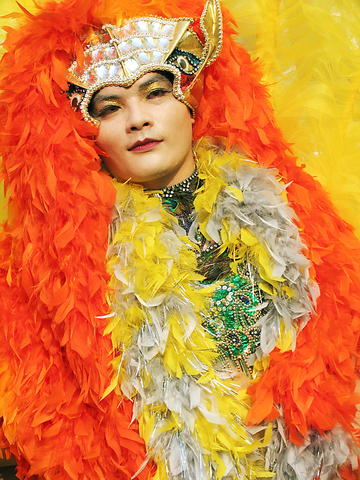Taiwan's lesbian, gay, bisexual and transgender (LGBT) community will set off on its annual parade tomorrow in an effort to promote equality, fight discrimination and have some fun.
Taiwan Pride 2005, organized by the Tongzhi Hotline Association (台灣同志諮詢熱線), will begin outside the Eslite bookstore at 1pm at the corner of Renai and Dunhua South roads and progress down Zhongxiao East Road, ending at the Taipei City Government offices at around 4:30pm.
Taiwan Pride activities this year include a costume competition for which contestants are required to register in advance, speeches, a celebrity guest speaker and a performance by local band La Zi (拉子). Members of Amnesty International Hong Kong's LGBT group will also join the parade to show solidarity.

PHOTOS: JULES QUARTLY, TAIPEI TIMES
There have been gay carnivals since 1999, but the first Pride parade, held in 2003, was organized as part of a government-sponsored festival. But last year Taiwan Pride organizers organized and funded the event themselves, citing limits placed on parade activities and a lack of political will to push through legislation that would make Taiwan the first Asian nation to allow gay marriage.
"We want to let the government know we demand our civil rights and that these must be written into law," said Ashley Wu (巫緒樑), the director of public affairs at the Taiwan Tongzhi Hotline Association.
The hotline, which operates under the name tongzhi, meaning comrade, provides services such as counseling for the LGBT community and receives some 800 calls a year seeking help on a wide range of issues.

Breaking from official support has freed the parade organizers to form alliances with other activist groups including the Association for Ri Ri Chun (日日春關懷互助協會) that advocates the rights of workers in the sex industry and BDSM which supports practitioners of sadomasochism and bondage.
The linkage has raised some eyebrows, but Wu argues these groups represent citizens that fall outside socially accepted norms of sexual behavior.
"We are in the same boat because society discriminates against tongzhi, sex workers and members of BDSM," Wu said.
Taiwan is generally seen as a relatively open society with violence linked to sexual orientation a rarity. But Josephine Chuen-juei Ho (何春蕤), professor at the Center for the Study of Sexualities, National Central University, said the relative lack of violence does not equate with acceptance or tolerance.
"The traditional Chinese culture of reticence, where most discrimination is done under the table, prevents open confrontation that would warrant a protest ... so that sort of limits what gay movements can fight," Ho said.
"They can only fight for certain issues that have become policy. But with the general homophobic atmosphere there's no place where you can put your fingers on and say you know there's something wrong here, we need to change this."
A prominent battle that has become a focal point for this years' Taiwan Pride march is the recent court case of Gin Gin bookstore owner J.J. Lai (賴正哲), who was convicted of selling indecent gay magazines. The case, which received widespread attention, is currently pending an appeal hearing at the Taiwan High Court.
For Wu and many other LGBT citizens, the case appears to be an obvious example of discrimination against the gay community.
Activists' arguments against the prosecution of Lai revolve around the perceived violation of civil rights.
"The importation of Western multiculturalism means that people tend to think that when multiculturalism is stronger there will be more room for gay activism, gay ideas, gay values, gay rights," Ho said. "But, on the other hand it also makes alternative views, gay-unfriendly views, become more pronounced."
For more information visit http://twpride.net/ or call (02) 2392 1969.

In the March 9 edition of the Taipei Times a piece by Ninon Godefroy ran with the headine “The quiet, gentle rhythm of Taiwan.” It started with the line “Taiwan is a small, humble place. There is no Eiffel Tower, no pyramids — no singular attraction that draws the world’s attention.” I laughed out loud at that. This was out of no disrespect for the author or the piece, which made some interesting analogies and good points about how both Din Tai Fung’s and Taiwan Semiconductor Manufacturing Co’s (TSMC, 台積電) meticulous attention to detail and quality are not quite up to

April 21 to April 27 Hsieh Er’s (謝娥) political fortunes were rising fast after she got out of jail and joined the Chinese Nationalist Party (KMT) in December 1945. Not only did she hold key positions in various committees, she was elected the only woman on the Taipei City Council and headed to Nanjing in 1946 as the sole Taiwanese female representative to the National Constituent Assembly. With the support of first lady Soong May-ling (宋美齡), she started the Taipei Women’s Association and Taiwan Provincial Women’s Association, where she

It is one of the more remarkable facts of Taiwan history that it was never occupied or claimed by any of the numerous kingdoms of southern China — Han or otherwise — that lay just across the water from it. None of their brilliant ministers ever discovered that Taiwan was a “core interest” of the state whose annexation was “inevitable.” As Paul Kua notes in an excellent monograph laying out how the Portuguese gave Taiwan the name “Formosa,” the first Europeans to express an interest in occupying Taiwan were the Spanish. Tonio Andrade in his seminal work, How Taiwan Became Chinese,

Mongolian influencer Anudari Daarya looks effortlessly glamorous and carefree in her social media posts — but the classically trained pianist’s road to acceptance as a transgender artist has been anything but easy. She is one of a growing number of Mongolian LGBTQ youth challenging stereotypes and fighting for acceptance through media representation in the socially conservative country. LGBTQ Mongolians often hide their identities from their employers and colleagues for fear of discrimination, with a survey by the non-profit LGBT Centre Mongolia showing that only 20 percent of people felt comfortable coming out at work. Daarya, 25, said she has faced discrimination since she